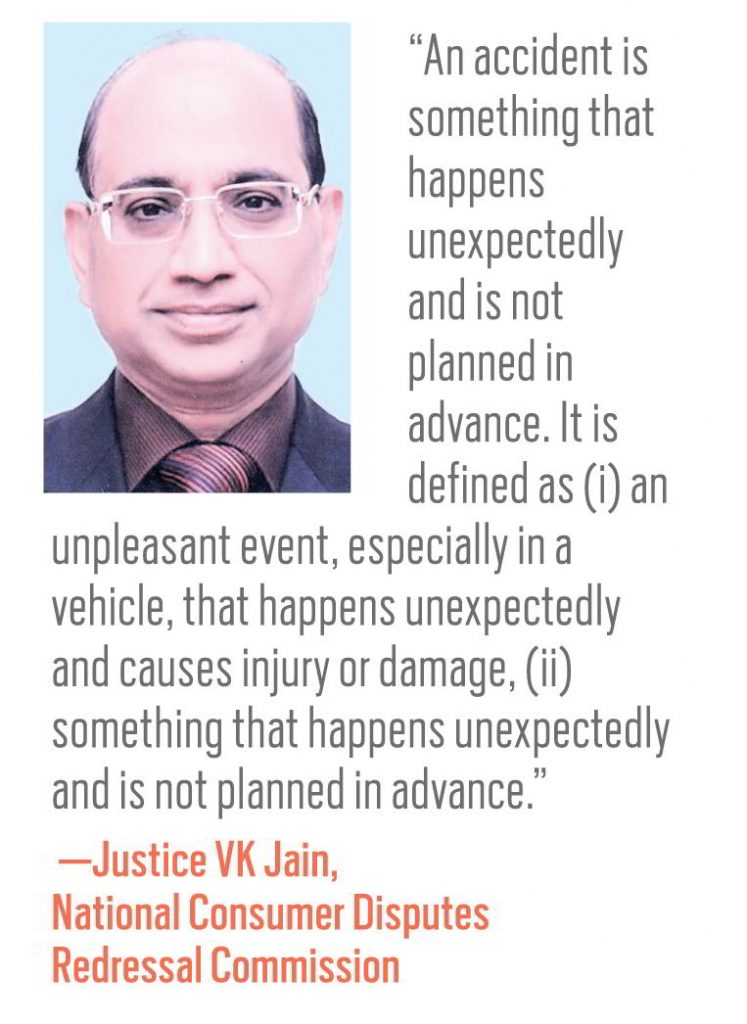
In a landmark ruling, the National Consumer Disputes Redressal Commission held that a malaria death was an accident and asked the insurer to pay up
~By Usha Rani Das
One has heard of chicken burgers, oregano and coffee costing insurance companies a packet. But have you ever heard of a company being forced to pay up for a mosquito bite? In a landmark case, the National Consumer Disputes Redressal Commission (NCDRC), the final authority in insurance arbitration, ruled in January that a mosquito bite is an “accident” and hence, the complainants are liable to insurance claims.
In the Mousumi Bhattacharjee vs National Insurance Co Ltd., the Commission ruled: “It can hardly be disputed that a mosquito bite is something which no one expects and which happens all of a sudden without any act or omission on the part of the victim… it is difficult for us to accept that the death due to mosquito bite would not be death due to an accident,” said Justice VK Jain, presiding member of NCDRC. The Commission also said that the insurer had included snake bites, dog bites and frost bites under the “accident” category.
UNFORTUNATE DEATH
It all began in 2012 when Mousumi Bhattacharjee lost her husband, Debashish Bhattacharjee, to a mosquito bite in Mozambique. Debashish, a Kolkata resident, worked as a manager in a tea factory in Mozambique. He fell sick and was admitted to Nampula Central Hospital where he died on November 22. The cause of death was malaria.
 Debashish had taken a housing loan under a scheme started by the National Insurance Company Limited (NICL) with the Bank of Baroda. This housing loan comes along with an insurance policy. Loans were disbursed under the “Bank of Baroda Home Loan Suraksha Bima”. He had paid a one-time premium for the sum insured. But when Mousumi filed for the claim, NICL rejected it saying a mosquito bite was not an accident and that malaria was a disease.
Debashish had taken a housing loan under a scheme started by the National Insurance Company Limited (NICL) with the Bank of Baroda. This housing loan comes along with an insurance policy. Loans were disbursed under the “Bank of Baroda Home Loan Suraksha Bima”. He had paid a one-time premium for the sum insured. But when Mousumi filed for the claim, NICL rejected it saying a mosquito bite was not an accident and that malaria was a disease.
NICL told the Commission that “a mosquito bite is not an accident under the said Suraksha Bima Policy nor does it fall under the definition of accident that merits an insurance payout rather mosquito bite causing malaria is an infection and/or is a disease. So, it is not liable to settle any claim against the terms and conditions of the policy and the perils”.
To this, Justice Jain said: “The term ‘accident’ has not been defined in the policy which the deceased had taken and therefore contextual dictionary meaning of the said term has to be taken for the purpose of deciding whether the death of the deceased was due to an accident or not. An accident is something that happens unexpectedly and is not planned in advance. It is defined as (i) an unpleasant event, especially in a vehicle, that happens unexpectedly and causes injury or damage, (ii) something that happens unexpectedly and is not planned in advance (Oxford Advanced Learner’s Dictionary [New 8th Edition]).”
OTHER DISEASES
When the insurance company said that diseases like dengue and malaria were epidemic and such orders would only encourage consumers to exploit insurance companies, the Commission said: “We are looking at death by mosquito bite and not every mosquito bite causes death.”

Even after the Commission’s order, Mousumi’s fight is far from over. Though the insurance company paid the Bank of Baroda Rs 11.5 lakh as part of the amount insured, the bank has allegedly refused to return the property documents mortgaged with it as it sought Rs 2.5 lakh from Mousumi. She has filed a complaint with the National Commission again.
This case is somewhat similar to the 1992 Stella Liebeck vs McDonald’s case where the company had to pay a humongous $2.7 million to Stella Liebeck who had spilled coffee from McDonald on herself and suffered burns. She alleged that the coffee was too hot. During the investigation, it was revealed that McDonald was aware of incidences where consumers have suffered burns because of the high temperature of their coffee.
Some consumers do get lucky.

